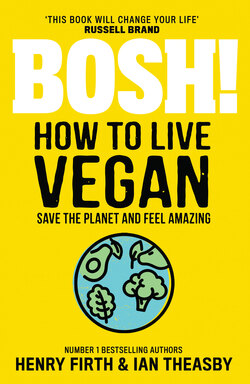Читать книгу BOSH! How to Live Vegan - Henry Firth - Страница 21
ОглавлениеUsing the same rule of supply and demand, cutting down on animal products reduces carbon dioxide and methane emissions, land and water use, rainforest deforestation and destruction of wildlife.
If going vegan seems a stretch too far, then even just eating one more plant-based meal per week is a powerful action. If everyone in the UK dropped meat from one meal a week, we could slash emissions by more than 8%, equivalent to taking 16 million cars off the road. It would also mean a 23% reduction in the UK’s domestic and international farmland use and a 2% reduction in our water use.[35] And in the US, if everyone replaced chicken with plant-based foods in one meal per week, the carbon dioxide savings would be equivalent to taking half a million cars off the roads. [36]
The international committee for climate change has said that in order for the UK to reach their emissions targets of a net zero emissions economy by 2050, households will need to undergo at least a 20% reduction in their beef, lamb and dairy consumption.
Source: Climate Change – The Facts
So the science really is that clear. The single biggest thing we can all do as individuals, much bigger than changing our approach to transport, is to eat more vegan, more plant-based meals. Given the wealth of experts across all fields of research telling us to eat fewer animal products, it’s time to act. We now know we can fight climate change with diet change. We are now aware of the consequences of our actions. Past this point, we’re to blame if we don’t take action.
Will we rise to the challenge and save the world we live in, for ourselves and future generations? Our preferences for meat and dairy have led us to destroy the planet, turning forest and grasslands into grazing lands because we love the taste of hamburgers. Come on, guys! That’s madness!
We make enough food to feed everyone on the planet, and yet nearly a billion people starve. We feed the food that they could eat to cattle, so that we can eat steak. Eighty-two per cent of the world’s starving children live in countries where food is fed to animals, which are then killed for meat and exported; eaten by wealthier individuals in developed countries like the US, UK and mainland Europe.[37]
It’s time we stepped up to the (vegan) plate and took some positive action.
Animal farming uses up 83% of global agricultural land, but provides just 18% of global calories.[38]
These were the facts that we faced four years ago, that led us, as extremely devoted lifelong meat eaters, to make the decision we made. We loved the taste of meat and dairy, but that didn’t sit right with us. We wanted to make a change. So we went vegan.
That’s all the bad news out of the way. Now for the good news.
Making the decision to cut animal products out of our diet was the best decision we ever made. It’s not restrictive. We eat a wonderful variety of foods and have all the flavours and choices we want.
Since becoming vegan we’ve both become infinitely more open-minded about our food choices. Closing the door on meat, dairy and fish has enabled us to open up a thousand other exciting plant-based doors. Our attitude to food now is far more broad-minded than ever before and, as a direct result, our diet is more diverse than we would ever have imagined.
